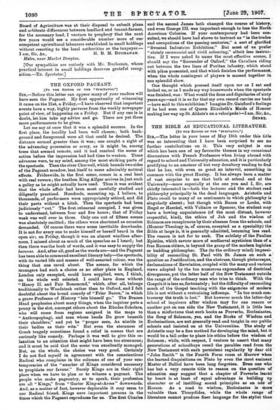THE OXFORD PAGEANT. pro TEES SOME OF ram ••SPItcTaTolan SIR, — Before
this letter can appear many of your readers will have seen the Pageant. My first opportunity of witnessing
it came on the .21st, a Friday,—I have observed that important events have a way, highly perverse from the weekly newspaper point of view, of happening on a Friday. But if any one is in doubt, let him take ray advice and go. There are yet three more performances to be given.
Let me say at once that it was a splendid success. In the first place, the locality had been well chosen ; both back- ground and foreground were all that could be desired. The distance seemed greater than it was ; one caught a sight of the advancing procession or army, as it might be, among trees that seemed remote, and it had reached the scene of action before the impression had had time to weaken. These advances were, to my mind, among the most striking parts of the spectacle. Then the river Cherwell, which bounds two sides of the Pageant meadow, lent itself to some admirably natural effects. Frideswide, in the first scene, comes in a real boat with real rowers; the heathen King Alfgar arrives in just such a galley as he might actually have used. Thus it was evident that the whole affair had been most carefully studied and diligently practised. Hundreds, mounting up. I believe, to thousands,of performers were appropriately attired, and did their parts without a hitch. Then the spectacle had been judiciously "cut." The first rehearsal occupied, I was given to understand, between four and five hours ; that of Friday week was well over in three. Only one out of fifteen scenes was absolutely omitted; the others were shortened as occasion demanded. Of course there were some inevitable drawbacks. It is not for 55517 one to make himself or herself beard in the open air; on Friday, though it was an almost windless after- noon, I missed about as much of the speeches as I heard; but then there was the book of words, and it was easy to supply the lacunae. And, after all, good as the words are—and the Pageant has been able to command excellent literary help—the speotacle, with its varied life and masses of well-assorted colour, was the thing that one cared about. The scenes, for which the managers had such a choice as no other place in England, London only excepted, could have supplied, were, I think, on the whole well selected. I could have done without "Henry IL and Fair Rosamond," which, after all, belongs traditionally to Woodstock rather than to Oxford, and I felt doubtful about the broad comedy of "Friar Bacon," in which a grave Professor of History "lets himself go." The Brazen Head prophesies about many things, when the inquirer puts a penny in the slot, amongst others about the Rhodes Scholars, who will come from regions assigned in the maps to " Anthropophagi, and men whose heads Do grow beneath their shoulders," and yet be "proper men, As nimble in their bodies as their wits." But even the sternness of Greek tragedy sometimes found a relief in scenes that are curiously like comedy. Perhaps it was well to give this re- laxation to an attention that might have been too strenuous; and it must be said that the scene was excellently managed. But, on the whole, the choice was very good. Certainly I do not find myself in agreement with the conscientious Radical who complains in the columns of one of your con- temporaries of the "number of Kings considered necessary to propitiate our favour." Surely Kings are in their right place when we have to plan or to witness a pageant. The people who make pageantry, so to speak, their profession are all "Kings." from "Garter King-at•Arms " downwards. And, as a matter of fact, however deplorable it may seem to our Radical friend, Kings were , important persons in the times which the Pageant reproduces for us. The int Charles
and the second James both changed the course of history, and even George III. was important enough to lose the North American Colotties. If your contemporary had been con- sulted, we should have had shows to instruct us "in the trades and occupations of the passing centuries," a sort of glorified "Sweated Industries Exhibition." But most of us prefer "stately ceremonial and vivid colouring," albeit less Warne." tive. If I were asked to name the most effective scenes, I should say the "Surrender of Oxford," the Cavaliers riding out between the two lines of Puritan infantry, which stand with pikes presented, and that which finishes the performance, when the whole contingent of players is massed together in one splendid show.
One thought which pressed itself upon me as I sat and looked on, or as I made My way homewards when the spectacle was finished, was What would the dons and dignitaries of sixty years ago–'and it is so far that my own record carries me back —have said to this exhibition P Imagine Dr. Gaieford's feelings if be had seen one of Queen Elizabeth's Maids of Honour making her way up St. Aldate's on a velocipede !—I am, Sir; &c., SENEx.
















































 Previous page
Previous page